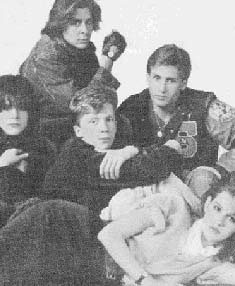Two Tribes
By Ted Rall
American politics are just as tribal-based as those of Afghanistan. But where they have Pashtuns and Tajiks, we have jocks and cheerleaders versus freaks and geeks. There are two types of high school students: the sunny kids whose eyes light up at the announcement of a pep rally, who race to the gymnasium to shout the fight song, and the sullen black T-shirt-wearing hordes who let out disgusted sighs while hunting for a hiding place to smoke cheap cigarettes. Conformists versus contrarians, extroverts versus introverts, fans of Top 40 music versus fans of obscure, critically-acclaimed bands, people who believe those in authority versus those who don’t. Athletes grow up to vote Republican, dorks Democratic. The great divide was chronicled by the John Hughes films of the 1980s—aggressive, bland privilege meets victimized, appealing alienation and wins—and it lives on in a classic right-wing Internet riposte to leftist posters: “You got beat up in school a lot, didn’t you?” Members of the in crowd can marry those of the out crowd, work together and even be friends, but they will never share basic assumptions about the way the world works.
It’s hazy now, but our two tribes used to agree about a lot more stuff. Democrats and Republicans both thought that Jimmy Carter was a nice man but an ineffective administrator, that Ronald Reagan was a good speaker, that Bill Clinton was a womanizer. Then the 2000 election was stolen and Bush exploited the 9/11 attacks as an excuse for wars of conquest and domestic political clampdowns. Republicans demanded total obeisance, Democrats refused, and both sides began spewing red-hot rhetoric that makes them irreconcilable.
 We Americans are about to vote on what kind of country we want to be. Will we continue down the same road we’ve followed for over two centuries, as an imperfect nation dedicated to the preservation and expansion of individual liberties, whose Bill of Rights stands both as its greatest achievement and its most shamefully unfulfilled ideal? Or will we lurch to the right, voluntarily cashing in our personal freedom in exchange for citizenship in an empire constantly at war, reviled by the rest of the world but—until history spawns a worthy challenger—its undisputed master?
We Americans are about to vote on what kind of country we want to be. Will we continue down the same road we’ve followed for over two centuries, as an imperfect nation dedicated to the preservation and expansion of individual liberties, whose Bill of Rights stands both as its greatest achievement and its most shamefully unfulfilled ideal? Or will we lurch to the right, voluntarily cashing in our personal freedom in exchange for citizenship in an empire constantly at war, reviled by the rest of the world but—until history spawns a worthy challenger—its undisputed master?
Issues like same sex marriage and partial-birth abortion lead to a lot of spilled ink but are relatively inconsequential in the big picture of American politics. What divides our left from our right—each of which considers the other dangerous, if not treasonous—are competing visions of the United States. Were America’s military and economic dominance over the globe to fade while our living standards and constitutionally-guaranteed freedoms remained intact, liberals wouldn’t fret all that much. As we’ve seen since September 2001, on the other hand, conservatives don’t lose sleep over increasing poverty, police checkpoints, censorship or racially motivated arrests or indefinite detentions since they see those developments as supporting the primary aim—world domination.
John Edwards talks about “two Americas,” two classes for whom opportunity is either a birthright or a pipe dream. What he describes is real, yet the other gap—between those who see the U.S. as a nation based on individual rights and those who see it first and foremost as a powerful empire—is almost impossible to bridge. Individualists and imperialists can’t agree to disagree because they don’t even agree on what the United States of America is, or what it should become.
Republicans, who view George W. Bush as a commander in chief leading the empire into dangerous battles abroad against hostile savages, equate him with the nation itself. “Why do you hate America?” they reply to his critics. Liberals, who view presidents as taxpayer-funded employees, are inherently hostile to the notion that any one man can be the embodiment of a democratic America. They roll their eyes at what they believe to be a cheap rhetorical advice although, in fact, the conservatives are dead serious about the question.
So half the electorate looks at George W. Bush and sees a courageous, plainspoken man of integrity, comparable to Churchill, whereas the other half thinks he’s a dullard and a pipsqueak whose strings are pulled by corrupt corporate executives.
Since support for Bush or Kerry has more to do with tribal affiliation than issues or suitability for office, neither the incumbent nor his opponent’s performance on the campaign trail nor the latest news on the economy or the wars budge the polls more than a few points back and forth. Incredibly, only one or two percent of the electorate remains undecided.
In a few weeks, either the imperialists or the individualists will emerge triumphant. The winning constituency will claim the right to decide what kind of country the U.S. is and should be. In truth, however, the two tribes of postmodern American politics are too closely matched for any election to settle that question. n